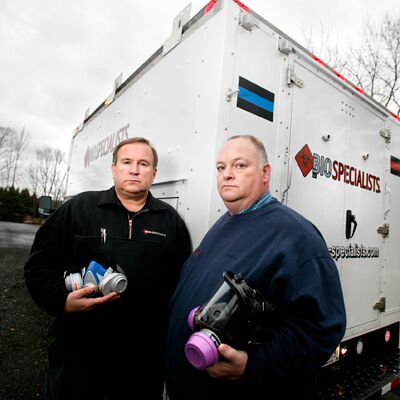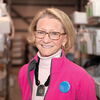Biospecialists' technicians restore normalcy after a tragedy
 Photo/Tim Greenway
Richard Shepard, left, and William York stand with their respirators in front of the Biospecialists refitted ambulance, ready to respond to traumatic messes
Photo/Tim Greenway
Richard Shepard, left, and William York stand with their respirators in front of the Biospecialists refitted ambulance, ready to respond to traumatic messes
William York wants to be the person people call when they have to deal with life's distressing and gruesome aspects. Seventeen months after founding Biospecialists LLC in Gorham, York and his team are prepared to respond to requests throughout New England, at any hour, to clean up the organic remnants of suicides, homicides, decomposing corpses and hoarding. His team brings stronger chemicals, greater safety precautions and more formalized decontamination training to the job than more mainstream cleaning services, York says.
"This is an absolute needed service for a family going through a tragedy," York says, sitting recently in his basement home office on Libby Road, dressed in a black Biospecialists sweatshirt embroidered with a small red biohazard symbol. "We start the grieving process by taking away any traumatic evidence."
Since opening, Biospecialists has responded to just about 100 calls in Maine, New Hampshire, Massachusetts and Rhode Island, says York, far more than the five per year he originally expected. His company's growth has allowed him to hire 19 part-time technicians, starting at $25 per hour, and rent a satellite office in Brookline, Mass., which he plans to staff with four part-timers within the next three months. He's also considering opening a location in Florida, he says.
The trajectory of Biospecialists's growth reflects the curve nationwide in the decontamination industry, which originated roughly 15 years ago and continues to develop, according to Kent Berg, who founded the National Institute of Decontamination Specialists in Piedmont, S.C. Berg opened his training center in 2006 to offer classes in "the clean-up and remediation of very specific health hazards." The institute offers one- to four-day courses on decontaminating crime and trauma scenes, methamphetamine labs, hoarder homes, and disease outbreaks in schools and other venues.
Berg says he first noticed a need for the services while working in emergency medical services. "I saw this happening all the time. Paramedics would respond to a scene, transfer the living or declare someone dead; then they would leave and express their condolences to the family," he says. "But then the family was left with these horrible scenes. I thought that was wrong. I thought someone needed to change that, so I started to do it."
About 1,000 students, including York, have enrolled in the institute's courses, says Berg, who also estimates that 1,000 decontamination companies operate now. The industry as a whole is worth about $100 million, with an average company able to earn a six-figure income. And, he adds, there's still room for growth, particularly in New England, but warns that the business is a difficult one.
"One of the things I've found is that there are a number of people who get into this business for a variety of motives," Berg says. "There's the attraction of big money, quick and easy, because the [clean-up] bill is big, but the reality is you don't do a job every day, so the money has to stretch awhile before the next job comes in." Plus, as in any business, marketing, professionalism, competence and competitive rates are all critical to success, he says. "The people who are most successful are those who are in it to help the families through a very traumatic time."
Answering the call
Part-time Biospecialists technicians Richard Shepard, Robert Simmons and Ben Moreland gathered at York's home recently to talk about the business, with Shepard, Simmons and York drinking Dunkin' Donuts coffee — a fitting activity since the idea for the business began over a cup of coffee in 2009, says Shepard.
Before launching Biospecialists, York ran a body delivery business, with help from Shepard, called New England Livery Services, which he still owns. The company picked up bodies from hospitals, nursing homes, private homes, automobiles, etc., to drive them to funeral homes or the airport. Out on a call one day, York and Shepard found themselves with extra time after the family asked for another hour with the deceased. The two men went to their favorite haunt, Dunkin' Donuts, and there hatched a plan to move away from delivery and into decontamination.
In some ways, they were well suited for this line of work. York's father had been in the funeral business for 48 years in Maine, and Shepard works in fire service. Simmons is a full-time firefighter and Moreland is a full-time police officer. "It was a natural progression," Shepard says. "Our careers helped us to be prepared for this."
Once York decided to start the business, he attended training at the National Institute of Decontamination Specialists and purchased equipment, liability insurance and workers' compensation, and a used ambulance and trailer. He says he's invested roughly $350,000 of his personal savings. When he outfits the Brookline office, and possibly opens a Florida location, he says that figure could reach half a million dollars. But with the rate of growth he's seen so far, York predicts it won't take him long to break even.
Biospecialists has had jobs calls ranging from wiping down a studio contaminated with antibiotic-resistant staph bacteria to cleaning a home where body fluids leaked through a floor into the room below. York says it's difficult to provide a rate scale for jobs, since every situation is unique. The location of death, the type of structure in which it occurred and the room size all affect prices. For every job, York supplies new hazardous-materials suits, scrub brushes, mops, chemical disinfectants, vacuum filters and hoses, and more, and he factors in the cost of travel and waste disposal. After responding to a call, the team inspects the damage and estimates how much time and equipment the job will require before giving an estimate.
Berg says, on average, a clean-up job is $1,000 to $5,000, but if it's especially messy, it could be more. "It's not cheap," he admits, "but most of the time it's covered by homeowner's insurance." He warns that he's heard of some unscrupulous companies charging "absolutely horrific amounts of money," $30,000 to $40,000 per job.
York says his assignments have ranged from an $800 job to clean up an area outside of a car in which someone had committed suicide, to $24,000 to clean an unfinished room in which someone had been killed with a high-powered rifle. The latter assignment took 16 hours with four technicians. The team always wraps up its work in one visit, York says. "We don't want to be in the family's way at all," he says. "We get in and out quietly and efficiently. We get the jobs done fast so they don't have to deal with people coming in and out."
The team also makes sure it is comprehensive. "We wash dishes, mirrors, windows," Shepard says. "When we leave, it's in move-in condition. There's no flies, no smells." York says Biospecialists wants to avoid having a family member later open a closet to find a spot of blood or other evidence of the deceased — a discovery that can retrigger trauma. "We have to search everything; we open doors and drawers. We check every inch of the room," he says. That level of detail is important: Moreland once found a tooth in a sneaker under a cabinet.
The technicians use a product called the Biological Indicator, which can detect invisible traces of saliva, urine and blood, York says. "It is a great aid," he says. "That's why our company is not like a fire-and-water damage company because we attack this stuff at the microbial level." In Maine, York says, his competition comes from the franchises SERVPRO in Gorham, which specializes in mold, fire, smoke and water damage, according to its website, and the Service Master brands, which include Merry Maids, a home-and-office cleaning company.
When it's necessary, Biospecialists' technicians rip up carpets, remove furniture and refrigerators and, if the contamination has spread underneath floorboards, tear up those. "We have to chase it if it's a liquid migration," Shepard says. Moreland says the work helps restore value to property. "Oftentimes people move forward, sell the property," Moreland says. "They can't get the value if there's a bad odor or stains. They might see our services as expensive, but we help them move on."
Every technician wears protective garb from head to toe, plus a respirator, rubber gloves, knee pads, booties, goggles and a face shield. Touching blood and other human fluids could expose staff to pathogens such as hepatitis C and HIV. Simmons says, "It's not as simple as wipe your hands, wash your hands. You have to ensure that the equipment is clean. I have a five-year-old daughter, and I'm not going to bring a disease home to that kid."
Biospecialists' future
Biospecialists' greatest challenge is getting the word out, says York. "It's a really tough business to market because people think this will never happen to them, that this will never be a service they'll need," he says.
Berg, who teaches a course on business startup and marketing for crime and trauma scenes, agrees that companies can't resort to traditional marketing because of the often grisly and sad nature of the business. "You can't offer an incentive deal; you can't offer a two-for-one," he says. "That's the real key to this business — understanding how to market and where to market."
York says he's spreading the word of his services by alerting police departments, funeral parlors, insurance companies and other agencies. He also offers classes for paramedics, funeral directors and firefighters about pathogens and safety. In this way, York says, he's taking the company in new directions as he discovers different needs in the market. While he started by concentrating on death scenes, he has since moved into cleaning homes occupied by hoarders, which are filled with pet or human debris. He's also offering to transport biomedical waste to disposal sites for clients such as funeral directors, dentists, doctors and housing agencies.
Despite the challenges of the work, York says he enjoys his job. Part of this comes from the satisfaction he says he gets from helping families. He can relate to their loss and suffering because his brother committed suicide 14 years ago, he says. "I wish we'd had someone to clean it up," he says. "The only thing that helps people in those scenarios is time. Time is the greatest thing; we all have to deal with these things, and if we can take this burden of mental stress away, to not see things and relive an event, we'd have done the family such a favor."
DOWNLOAD PDFs
Biospecialists technician Ben Moreland suits up to respond to a hazardous scene










Comments